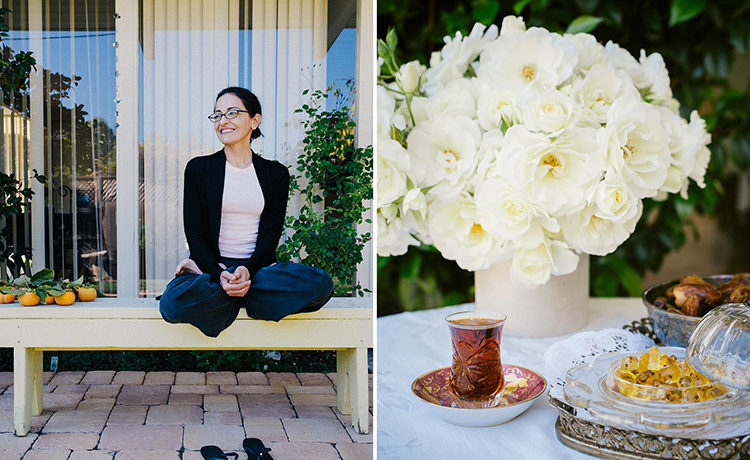
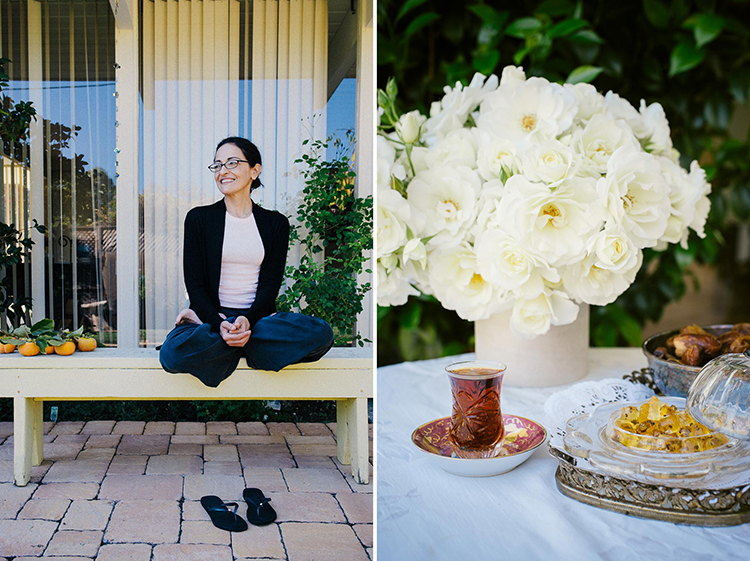
A Persian Feast with Mojdeh Z.
For our next Tapestry Suppers event I’m really excited to share the words and culinary talent of my friend and yoga teacher, Mojdeh Z. Coming from a family where the cooking and sharing of food was part of the fabric of daily life, she understands, intuitively, the power of the meal in forging connections with others, as you will see in her story below.
A few years ago she invited a small group of us for a simple Persian lunch. We were greeted with a spread enough to feed 10 or more hungry souls. There was rice prepared two ways, an assortment of salads, a range of stews, dips, herbs, bread and don’t forget the sweets! It was a homecooked Persian feast, which is always the best kind. I’m thrilled that more people will get to taste her delicious cooking on Saturday, May 20 with proceeds benefiting Moms Against Poverty (MAP). Join us by purchasing a ticket on Eventbrite.
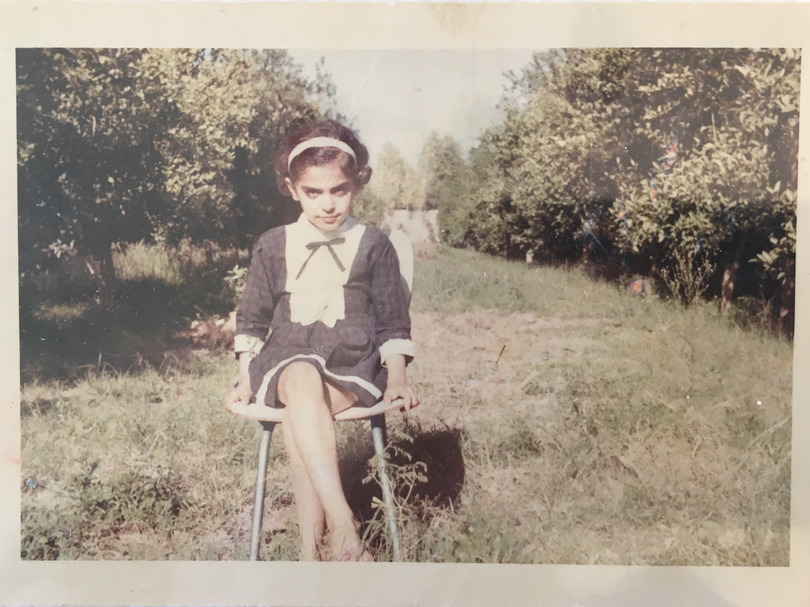
Mojdeh, aged about 8-10 years old here enjoying the sun in her father’s citrus orchard.
Where did you grow up? Please describe what your hometown was like.
I grew up in Dezful, Iran, the oldest of four siblings. Dezful was then a small city in the state of Khuzestan. This region of Iran is famous for its vast oil reserves as well as agriculture. My father owned agricultural lands in the countryside. He had the vision of turning all his land into citrus orchards. I grew up seeing my father growing citrus trees from seeds and eventually planting them in the land. He built a house in the middle of his first orchard and when I was 5 years old we moved from the city into this house. I grew up loving this house, the land, the citrus orchards, and all that comes with living in the country: fresh air, water, fresh fruits and vegetables to name a few. This home and the orchard were a huge playground for my siblings and I. Our house was always filled with other family members and friends and the children always wanted to stay over because we would all have a blast running around in the orchards, climbing trees and playing.
From 1st through 6th grade my father drove me to and from the city daily for school. Once I reached 7th grade we moved back to the city. Again, my father built another house there in order for us to be close to middle and high school. Education was very important in my family and that was the reason that I came to the US: to pursue higher education. When I finished high school, I applied to several universities and the first acceptance letter came from Utah State University in Logan, UT in late February 1978. The letter stated that I had to report to the university office of foreign student advisor in Logan itself by late-March, leaving me three weeks to get a visa and leave Iran. I remember, my father and I drove to Shiraz (the land of Hafiz, the Persian Poet) to the nearest US Embassy, which was over 700 km (435 miles) away. We drove all night to get to our destination. The next day I received my US student visa. We had nearly two weeks left to get all my affairs in order and say goodbye to family and friends, and go to Tehran to catch my flight. My memories of those days are still surreal, things happened really fast.
It was very hard to leave my family. It was also very scary. I had never travelled on my own within my home country let alone travelling abroad to a country on the other side of the world. As I recall on the plane from Tehran to London, I cried for about five hours. Once we got to London, I decided that I am going to be fine and I stopped crying and surrendered to the circumstances at hand. Initially, I had no intention to stay in the US. My goals were to complete my higher education and return to Iran. However, once the political climate changed, my plans for the future changed as well.
When did you arrive in the US and what were the early months like?
I arrived in the US on March 20, 1978, in Salt Lake City, UT. I had just turned 18 and had a limited knowledge of the English language. Within a couple of days I was living in West High Rise dormitory at Utah State University in Logan, UT and started my English courses. I adjusted to life in Logan very quickly. I was fortunate enough to have cousins who lived there as well as in other parts of the US and made a lot of friends at the university. People in Logan were very friendly and very respectful. Most of my time in Logan was spent on-campus with other students as well as professors. Utah State University campus was beautiful. I have very fond memories of my interactions with my colleagues.
For the most part I really never felt alone. During the first six months that I lived on-campus, I started making Persian food in the dormitory kitchen and invited the people that I had met to share the food with. I also started celebrating the Persian new year, NoRooz, and invited all my friends to come to my home for the celebration. I brought people together by making Persian dishes all the time. I would often cook at my friend’s houses just for the purpose of getting together and to share a meal.
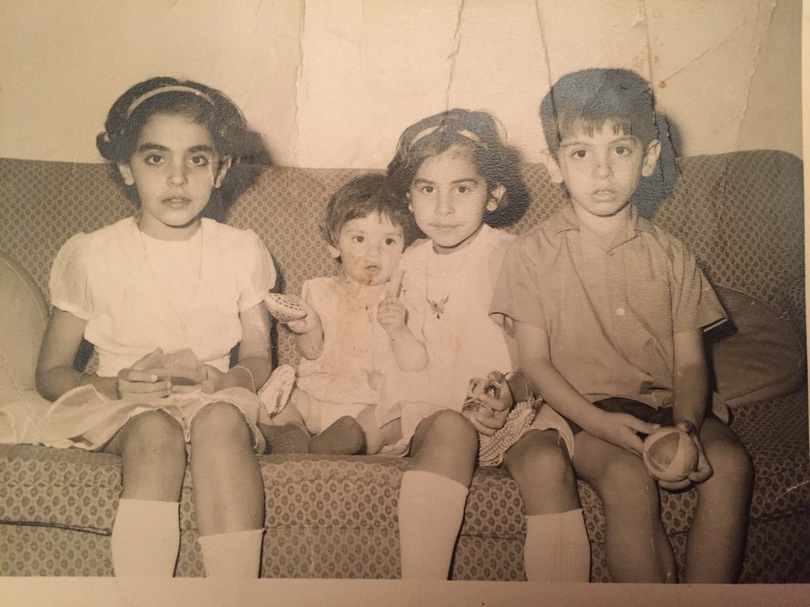
Mojdeh (at left) with her younger siblings at home.
Were any other family members able to visit you in the early years?
In September 1978, my younger brother joined me in Logan. This was part of my father’s bigger plan to send all his children to the US but things did not go as planned. By the end of 1979, the US embassies were closed in Iran and travelling to the US became very difficult. In addition, the nine-year war between Iran and Iraq began in September 1980, devastating the whole country. In September 1982 after I graduated from engineering school and before starting graduate studies, my parents came to visit me in Logan after going to Germany and obtaining a visitor visa. We later found out that my father had been diagnosed with Pancreatic cancer. From September 1982 through January 1983 my father received treatment for his cancer in Ogden, UT. We drove the 50 miles between Logan and Ogden for his treatment on a daily basis. He and my mother returned to Iran in February 1983 where he was taken directly to the hospital and passed away on February 26, 1983. My brother and I were not able to attend his funeral.
Do you still have family in Iran and do you go back to visit them?
One of my sisters still lives in Iran as well as extended family. I have been fortunate enough to be able to go back on a regular basis. The last time I was in Iran, was in 2011 when the four of us, (siblings) and our children were together for my Niece’s wedding.
When did you move to the Bay Area?
After finishing graduate studies I moved to the Bay Area in May 1985 and have been here since. It is very different from Logan and it became my second home right away. I worked for several environmental consulting firms and my last corporate job was with FMC Corporation in San Jose, where I worked as an environmental remediation manager for nearly 16 years. I left FMC in 2007 and after a year of consulting in the environmental field I decided to fully dedicate myself to the healing arts that I had been studying on the side for many years.
Since leaving Iran in 1978, you’re now approaching 40 years of living in the US, how do you feel about that?
I have a lot of family and friends here and have assimilated really well. I am very grateful for my life here in the US. We are blessed with so much. The opportunities are endless. For the most part I have always felt that life in the US has been very supportive of all my aspirations. I am so grateful for the communities that I belong to. Yet, Iran will always be my first home. The energy I feel when I step into Tehran International Airport is beyond explanation. You just cannot help but notice it. I will always miss the sights, the smells, the noise, the conversations in the background, and a lot more. Going to Iran takes me back to my happy childhood memories.
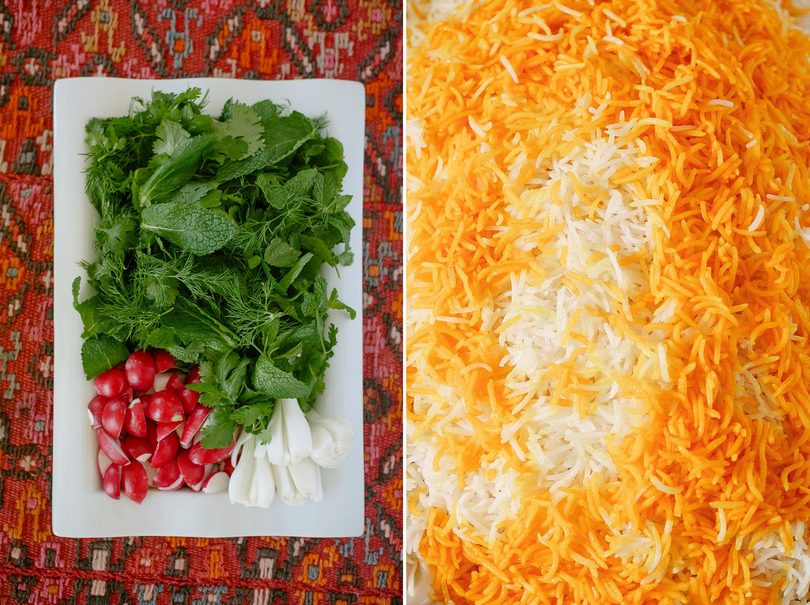
Will you be cooking any family recipes for the event?
Cooking was a big part of our family life. We always had people over for lunch and dinner. My parents threw huge dinner parties and my mother’s cooking was talk of the town. My mother cooked with a lot love.
My family also prepared food for philanthropic purposes. On special occasions, my mother would cook for over 150 people for this purpose. I wish I took pictures of those meals. I have always wanted to do what my parents did, cooking for a good cause. When Danielle asked me to do this, I did not hesitate.
I learned to cook by watching my mother cook. I was 14 years old when I made my first meal for my family. I really do not have any Persian food recipes written down. I cook from memory. For our May 20th gathering, I will be making Herb Rice (Sabzi Polo), Jeweled Rice (Shirin Polo), Eggplant Stew (Khoresh e Bademjan), Eggplant Dip (Kashk e Bademjan), Herb Stew (Khoresh e Ghormeh Sabzi), and more, all of which are traditional Persian dishes that I learned from my mother. Persian food is really about pouring your love into your food so that the people you share it with feel that love.
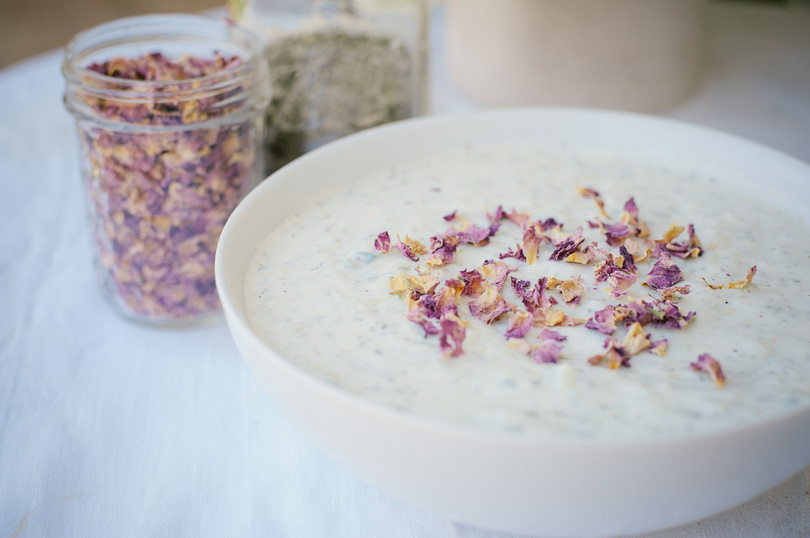
Are there any other anecdotes about your immigrant experience in America that you would like to share?
Being an immigrant is hard for everyone, especially at first when one moves to a strange land. It takes time to grow roots and find a sense of identity. It takes time to find a sense of belonging. It becomes even harder when geopolitical circumstances interfere and affect the lives of ordinary people. It is not easy to hear the name of the region or an ethnicity that you belong to being mentioned on the news with negative propaganda.
The cardinal rule for an immigrant is working hard. I studied all the time in school. I worked long hours at my jobs. The hardest part was losing my loved ones. Within a span of ten years I lost my father, my grandmother, and my mother and I was not able to attend their funerals. At times I felt a rug has been pulled under my feet. But focusing on collateral beauty rather than collateral damage is what has allowed me to be hopeful, to look to the future and heal. At the end of the day, we all are the same.
I have seen so much kindness and generosity from American people in my darkest moments. I will never forget my father’s oncologist in Ogden. After my father died, I informed him about my father’s passing. This amazing doctor said that we no longer needed to pay him the remaining medical bills that were owed. There are many more anecdotes like this one. It would take hours and hours to write about it. This act of kindness from that doctor changed my entire perspective about how generous we can be with whatever we have to offer each other.
To end, I would like to finish with a line from the Rumi poem, “Moses and The Shepherd“:
We are here to bring each other together
We are not here to create means of separation
The story behind this poem is that Moses gets angry when he sees a shepherd talking to God in a very earthly fashion as though he is talking to a person. He starts to berate the shepherd when Moses hears a revelation from God: “You are here to bring people closer to me not to separate them from me…….everyone speaks to me in their own way…… I Pay attention to the intention behind the word…..”. The message of this poem is one of universality and acceptance. That we are all unique and we have our unique ways about us. Ultimately we are on the same path and we are here to enhance each other’s lives .
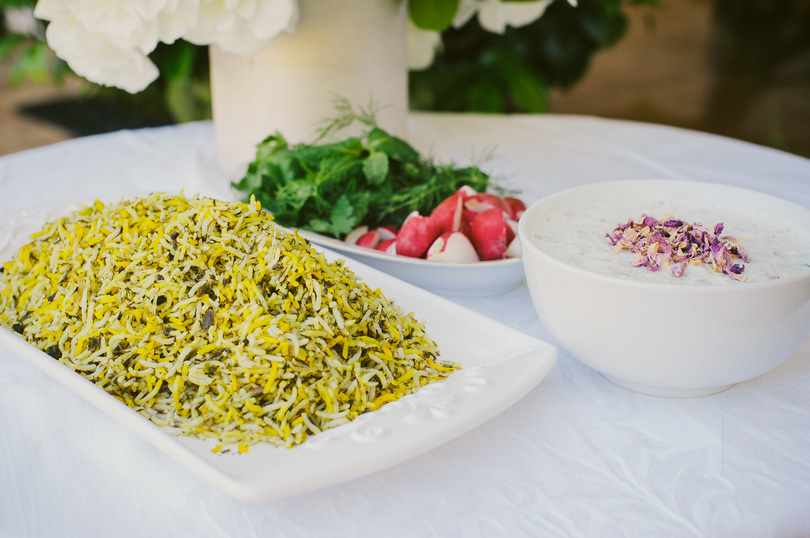
Next steps:
- To attend Mojdeh’s Persian Feast on Saturday the 20th, head over to Eventbrite to purchase tickets and register.
- Sign up for our newsletter to be the first to know about upcoming events.
- Send me an email if you’d like to host and/or cook a meal, or if you know of someone who would be a good fit.
- Follow us on Instagram.
- Donate: this is very much a labor of love so any support for operating expenses are always welcome.

